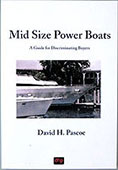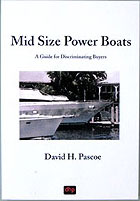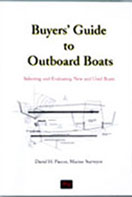What Does an Overhaul Entail?
Dealing With Engines Part II
by David Pascoe
In the first part of this series, we discussed how to view the claim that a used boat has overhauled or rebuilt engines. The bottom line is to view such claims with suspicion until the claim can be proven. In this part we discuss in greater detail why that is so, and just how complex the issue can be.
Most engine overhaulers are very reluctant to perform partial overhauls. In almost no case will they give any kind of warranty unless every aspect of the engine is gone through and all necessary parts and components replaced.
Because of that, most reputable overhaulers do not like to make partial overhauls. If some other old part breaks down and wrecks the engine, one that was not, but should have been replaced, the owner usually comes back knocking on their door claiming that they didn't do something right. If they do accept half-way overhauls, the invoices will usually say NO WARRANTY.
However, not all engine rebuilders play by the same rules. In many regions there are mechanics that work out of the back of trucks and small rented garages. These are the ones most likely to take on any kind of job requested by a boat owner, no matter how unreasonable or ill-advised.
As we often emphasize, high performance diesels are complex pieces of machinery, which is why the cost so much. They are a completely different animal when compared to a simple, naturally aspirated low power diesel that turns out a hundred or two horsepower. Hi performance engines can contain three times as many parts and components than a simple old 6 banger diesel.
Many people think of an overhaul as consisting of replacement of bearings, rings and cylinder liners. But that's only part of the story. Here's the rest:
- Cylinder heads & valves
- Crankshaft seals
- Injection pump
- Injectors
- Fuel cooler
- Turbo chargers
- Blowers
- Intercooler
- Exhaust riser or elbows
- Sea water pump
- Circulating pump
- Oil cooler
- Heat exchanger
- Thermostats
- Senders & sensors
- Drive plate adaptor & dampner
In addition to this list of major items, on every overhaul there will be numerous ancillary and apparently minor parts -- bolts, nuts, rings, pins, sleeves, shims, o-rings, gaskets, and etcetera -- that also add up. Then there will be the waste disposal charge, environmental charge, new oil, fluids and, of course, the onmipresent taxes. All of which usually creates quite a few pages of paper to contain all the details.
Of course, when you add up the cost of all these items, whether to repair or replace as the case may be, the estimated cost of doing just cylinder kits and bearings doubles. Then you have to consider the unexpected problems that may crop up, such as discovering a cracked cylinder head or manifold.
Now, one of the reasons we emphasize that you should always get invoices to verify the so called overhaul, is that only a detailed invoice can tell you to what degree the overhaul was carried out. Not even the most sophisticated engine survey can tell you that.
Hopefully, this gives you the incentive not to treat that term "overhaul" casually. How deeply you delve into the issue of a claim for recent overhauls is an issue of serious money that warrants some serious investigation. into the truth of the matter.
Let's say the subject boat is 12 years old. We'll use something of a worst case scenario here and say that one engine was overhauled, the other not. You have the invoice in hand and it shows that basically the rings, liners, bearing were replaced. None of the other items contained in our list above appear on that invoice. The aforementioned items were replaced and the engine simply buttoned back up with all the original parts that still, of course, have 12 years worth of wear.
Do you really have a "rebuilt" engine in this case? No, you don't. What you have is a partially rebuilt engine. All the remaining parts still have 12 years worth of wear. After all this money was spent, is the engine really more reliable than it was before? Obviously, only in terms of those few parts that were replaced, but as the new owner, you're still left with facing all those other parts that weren't rebuilt. Any one of these remaining parts could still cause you trouble.
At what time the overhaul was conducted relative to the period of ownership is often relevant. When done early in the ownership period, the greater chance that more of the engine was gone over to make sure that all is well. Why? Because the owner knows that he has to live with the results. When an overhaul is done shortly before the boat is put up on the market, chances are greater that the boat was just being "made ready" to sell, and that as little as possible was done to "get by". The current owner won't have to face future problems, the new owner will.
These are among the things that a detailed set of invoices will reveal. All you have to do is go down the list of components that are on the engine, and check these against the invoice in order to see what was done. Or not done. The length of the parts list can very quickly size up the scope of "rebuild."
A major overhaul is technically a "rebuild." All the major parts and systems are gone over. Whatever needs to be done, gets done. Anything less basically falls into the category of repairs, which often raises as many questions as it answers.
See also It's Got Recent Overhauls!Dealing with engines Part I
Uploaded March 28, 2000

















David Pascoe is a second generation marine surveyor in his family who began his surveying career at age 16 as an apprentice in 1965 as the era of wooden boats was drawing to a close.
Certified by the National Association of Marine Surveyors in 1972, he has conducted over 5,000 pre purchase surveys in addition to having conducted hundreds of boating accident investigations, including fires, sinkings, hull failures and machinery failure analysis.
Over forty years of knowledge and experience are brought to bear in following books. David Pascoe is the author of:
In addition to readers in the United States, boaters and boat industry professionals worldwide from nearly 80 countries have purchased David Pascoe's books, since introduction of his first book in 2001.
In 2012, David Pascoe has retired from marine surveying business at age 65.
On November 23rd, 2018, David Pascoe has passed away at age 71.
Biography - Long version